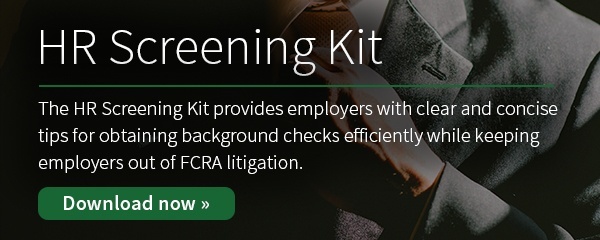
The Fair Credit Reporting Act (FCRA) places limits and rules on the usage of consumer reports by both employers and landlords. As such the following duties must be carried out when you are making use of a personal consumer report.
Employer and Landlord Responsibilities under the Fair Credit Reporting Act.
Permissible Purposes
The first rule of the Fair Credit Reporting Act is that you must have a permissible purpose to review someone's personal consumer report. The reasons for this are based on personal privacy and thusly keep personal records away from those who don’t have a purpose for reviewing such data.
As an employer, as long as you have the consumer’s permission, you may review their records for hiring purposes.
As a landlord, you also have a permissible reason as you are reviewing their data for the purpose of entering into a rental contract because the consumer is seeking to rent a property from you.
You Must Be Properly Certified
As per the Fair Credit Reporting Act, you can only acquire consumer reports when you are properly certified to do so. Certification in this case means you have to report to the consumer reporting agency the purpose and usage of the consumer report. Also, you cannot use a report for any other reason but the ones you have stated.
You Must Notify The Consumer in Cases Of Adverse Action
Adverse action, defined by the FCRA, means refusing a hire, promotion, or rejecting a lease or rental application. When communicating with the consumer, you need to do so in either writing, electronic communication, or verbally (i.e. in person or via phone).
No matter the method the following information must be included:
- the address, name, and phone number of the agency you received the report from,
- a statement that the reporting agency had no impact on the decision made,
- a statement that the consumer can receive a copy of the report free of charge within 60 days, and
- a statement that the consumer can challenge any aspect of the report with the reporting agency.
- Do note that the consumer also has the same 60-day right to receive any information reported on by third party and other non-credit affiliate agencies.
Account Alerts
It is not uncommon for consumers to have alerts in their account. As per the FCRA, a certain amount of due diligence is required in these cases. Two alerts you commonly see are fraud alerts and active duty military. When a consumer has such flags in their account that means that any consumer reporting agency you use has to further verify that their information is correct. This is done through direct contact with the consumer at a phone number submitted and verified by the consumer personally. As a potential employer or landlord, make sure the reporting agency you are using is reputable and following these procedures to avoid false positives and Fair Credit Reporting Act violations.
Reporting Of Bad Addresses
When the address on file with a consumer reporting agency differs than the one you report from the consumer, you will be informed of this by the agency. When this occurs, you must follow the process of action as defined by the Consumer Financial Protection Bureau and local regulators.
Proper Disposal
Lastly, you have to dispose of such sensitive consumer information as per the steps and processes defined by the by the Consumer Financial Protection Bureau, local regulators, and the Securities and Exchange Commission. Always review your disposal methods so they meet required regulations.
In order to stay within the required regulations and consumer rights protection, continued education is a must. VeriFirst representatives are FCRA certified and are always available to help.

(Note: As of 2017, this post has been updated from its original publish date.)